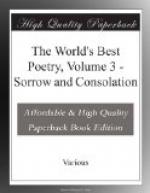ELIZABETH BARRETT BROWNING.
* * * * *
IV. COMFORT AND CHEER.
TO MYSELF.
Let nothing make thee sad or fretful,
Or too regretful;
Be
still;
What God hath ordered must be right;
Then find in it thine own delight,
My
will.
Why shouldst thou fill to-day with sorrow
About to-morrow.
My
heart?
One watches all with care most true;
Doubt not that he will give thee too
Thy
part.
Only be steadfast; never waver,
Nor seek
earth’s favor,
But
rest:
Thou knowest what God wills must be
For all his creatures, so for thee,
The
best.
From the German of PAUL FLEMING.
Translation of CATHERINE WINKWORTH.
THE FLOWER.
How fresh, O Lord, how sweet and
clean
Are thy returns! even as the flowers in spring;
To which, besides their own demean,
The late-past frosts tributes of pleasure bring.
Grief melts away
Like snow in May,
As if there were no such cold thing.
Who would have thought my shrivelled heart
Could have recovered greenness? It was gone
Quite underground; as flowers depart
To see their mother root, when they have blown;
Where they together
All the hard weather,
Dead to the world, keep house unknown.
These are thy wonders, Lord of power,
Killing and quickning, bringing down to hell
And up to heaven in an houre;
Making a chiming of a passing-bell.
We say amisse
This or that is:
Thy word is all, if we could spell.
O that I once past changing were,
Fast in thy paradise, where no flower can wither!
Many a spring I shoot up fair,
Off’ring at heav’n, growing and groning
thither;
Nor doth my flower
Want a spring-showre,
My sinnes and I joining together.
But, while I grow in a straight line,
Still upwards bent, as if heav’n were mine own,
Thy anger comes, and I decline:
What frost to that? what pole is not the zone
Where all things
burn,
When thou dost
turn,
And the least frown of thine is shown?
And now in age I bud again;
After so many deaths I live and write;
I once more smell the dew and rain,
And relish versing: O my only light,
It cannot be
That I am he
On whom thy tempests fell all night!
These are thy wonders, Lord of love,
To make us see we are but flowers that glide;
Which when we once can finde and prove,
Thou hast a garden for us where to bide.
Who would be more,
Swelling through
store,
Forfeit their paradise by their pride.




